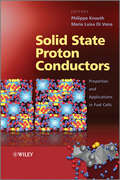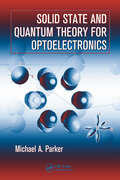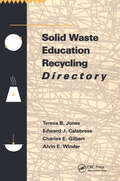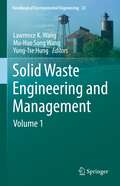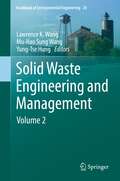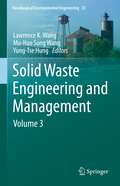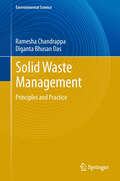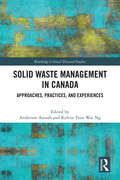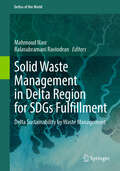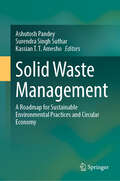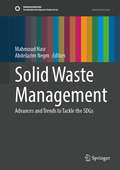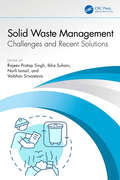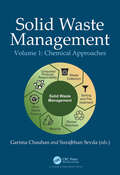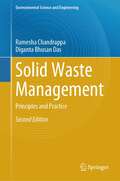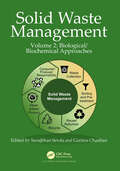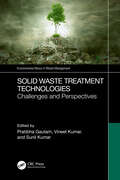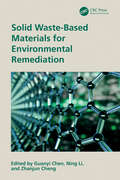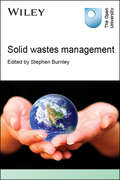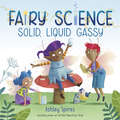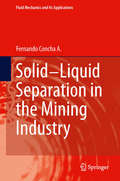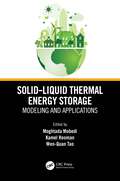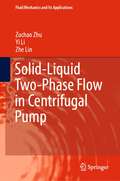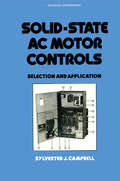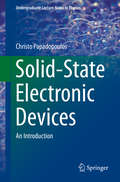- Table View
- List View
Solid State Proton Conductors
by Philippe Knauth Maria Luisa Di VonaProton conduction can be found in many different solid materials, from organic polymers at room temperature to inorganic oxides at high temperature. Solid state proton conductors are of central interest for many technological innovations, including hydrogen and humidity sensors, membranes for water electrolyzers and, most importantly, for high-efficiency electrochemical energy conversion in fuel cells.Focusing on fundamentals and physico-chemical properties of solid state proton conductors, topics covered include:Morphology and Structure of Solid Acids Diffusion in Solid Proton Conductors by Nuclear Magnetic Resonance Spectroscopy Structure and Diffusivity by Quasielastic Neutron Scattering Broadband Dielectric Spectroscopy Mechanical and Dynamic Mechanical Analysis of Proton-Conducting Polymers Ab initio Modeling of Transport and Structure Perfluorinated Sulfonic Acids Proton-Conducting Aromatic Polymers Inorganic Solid Proton Conductors Uniquely combining both organic (polymeric) and inorganic proton conductors, Solid State Proton Conductors: Properties and Applications in Fuel Cells provides a complete treatment of research on proton-conducting materials.
Solid State and Quantum Theory for Optoelectronics
by Michael A. ParkerWhile applications rapidly change one to the next in our commercialized world, fundamental principles behind those applications remain constant. So if one understands those principles well enough and has ample experience in applying them, he or she will be able to develop a capacity for reaching results via conceptual thinking rather than having to
Solid Waste Education Recycling Directory
by Edward J. Calabrese Teresa JonesThis directory thoroughly describes all of the solid waste education programs and materials available from all 50 states. If you are interested in starting a solid waste recycling program or improving what you have-this directory is for you. All programs K-12 are included, in addition to information provided on the other environmental programs available. The solid waste directory gives you names, addresses, phone numbers, materials currently being used, how you can get them, how much they cost or if they are free. This book will be of great interest to city managers and planners. All cities, towns and counties will want this book!
Solid Waste Engineering and Management: Volume 1 (Handbook of Environmental Engineering #23)
by Lawrence K. Wang Yung-Tse Hung Mu-Hao Sung WangThis book is the first volume in a three-volume set on Solid Waste Engineering and Management. It provides an introduction to the topic, and focuses on legislation, transportation, transfer station, characterization, mechanical volume reduction, measurement, combustion, incineration, composting, landfilling, and systems planning as it pertains to solid waste management. The three volumes comprehensively discuss various contemporary issues associated with solid waste pollution management, impacts on the environment and vulnerable human populations, and solutions to these problems.
Solid Waste Engineering and Management: Volume 2 (Handbook of Environmental Engineering #24)
by Lawrence K. Wang Yung-Tse Hung Mu-Hao Sung WangThis book is the second volume in a three-volume set on Solid Waste Engineering and Management. It focuses on sustainability, single waste stream processing, material recovery, plastic waste, marine litter, sludge disposal, restaurant waste recycling, sanitary landfills, landfill leachate collection, and landfill aftercare as it pertains to solid waste management. The volumes comprehensively discuss various contemporary issues associated with solid waste pollution management, impacts on the environment and vulnerable human populations, and solutions to these problems.
Solid Waste Engineering and Management: Volume 3 (Handbook of Environmental Engineering #25)
by Lawrence K. Wang Yung-Tse Hung Mu-Hao Sung WangThis book is the third volume in a three-volume set on Solid Waste Engineering and Management. It focuses on tourism industry waste, rubber tire recycling, electrical and electronic wastes, health-care waste, landfill leachate, bioreactor landfill, energy recovery, innovative composting, biodrying, and health and safety considerations pertaining to solid waste management.. The volumes comprehensively discuss various contemporary issues associated with solid waste pollution management, impacts on theenvironmental and vulnerable human populations, and solutions to these problems.
Solid Waste Engineering: A Global Perspective (Activate Learning With These New Titles From Engineering! Series)
by Christian Ludwig William Worrell P. VesilindEquip your students to address the growing and increasingly intricate problem of controlling and processing the refuse created by global urban societies with SOLID WASTE ENGINEERING: A GLOBAL PERSPECTIVE, 3E. While the authors prepare readers to deal with issues, such as regulations and legislation, the book primarily emphasizes developing and implementing solid waste engineering principles. The book first explains basic principles of the field, then demonstrates how to apply these principles in real world settings through worked examples. This proven approach helps your graduate or advanced undergraduate students learn to think reflectively and logically about problems and solutions in today's solid waste engineering.
Solid Waste Management
by Ramesha Chandrappa Diganta Bhusan DasSolid waste was already a problem long before water and air pollution issues attracted public attention. Historically the problem associated with solid waste can be dated back to prehistoric days. Due to the invention of new products, technologies and services the quantity and quality of the waste have changed over the years. Waste characteristics not only depend on income, culture and geography but also on a society's economy and, situations like disasters that affect that economy. There was tremendous industrial activity in Europe during the industrial revolution. The twentieth century is recognized as the American Century and the twenty-first century is recognized as the Asian Century in which everyone wants to earn 'as much as possible'. After Asia the currently developing Africa could next take the center stage. With transitions in their economies many countries have also witnessed an explosion of waste quantities. Solid waste problems and approaches to tackling them vary from country to country. For example, while efforts are made to collect and dispose hospital waste through separate mechanisms in India it is burnt together with municipal solid waste in Sweden. While trans-boundary movement of waste has been addressed in numerous international agreements, it still reaches developing countries in many forms. While thousands of people depend on waste for their livelihood throughout the world, many others face problems due to poor waste management. In this context solid waste has not remained an issue to be tackled by the local urban bodies alone. It has become a subject of importance for engineers as well as doctors, psychologist, economists, and climate scientists and any others. There are huge changes in waste management in different parts of the world at different times in history. To address these issues, an effort has been made by the authors to combine their experience and bring together a new text book on the theory and practice of the subject covering the important relevant literature at the same time.
Solid Waste Management in Canada: Approaches, Practices, and Experiences (Routledge Critical Discard Studies)
by Anderson Assuah Ng, Kelvin Tsun WaiThis edited volume takes a comprehensive look at solid waste management across jurisdictions in Canada, including provinces, territories, municipalities, and Indigenous communities. It provides the reader with an understanding of various solid waste management approaches, policies, practices, barriers, and innovations that are being pursued and developed by jurisdictions to solve their current challenges and improve current systems in place. Solid waste management remains one of the most challenging environmental concerns in the 21st century. Understanding its complexity by bridging theory and practice is essential for current and future management, and for achieving the Sustainable Development Goals. Using a multidisciplinary approach, contributors include social scientists, engineers, economists, scientists, urban planners, and practitioners in the solid waste management field, who utilize qualitative, quantitative, and mixed methods in examining solid waste management issues in Canada. Topics include solid waste management policy and governance, community- based approaches to waste management, waste management in northern, remote, rural, and Indigenous communities, landfill management and stabilization, and innovative and emergent waste management. This book is an important resource for researchers, undergraduate and graduate students, policymakers, solid waste management professionals, government officials, and members of the public interested in solid waste management.
Solid Waste Management in Delta Region for SDGs Fulfillment: Delta Sustainability by Waste Management (Deltas of the World)
by Balasubramani Ravindran Mahmoud Nasr“This book offers a comprehensive exploration of sustainable solid waste management practices in delta regions worldwide. With attention to detail, this work presents a systematic review, illuminating case studies, original research, and insightful meta-analyses tailored to address the unique challenges faced by delta environments. Home to over half a billion people, or approximately 7% of the global population, delta regions are dynamic ecological and social landscapes, despite accounting for only 1% of the world's land area. Yet, they play a pivotal role in national economies. Given the significant size and density of populations in these regions, understanding solid waste generation patterns, trends, and impacts is essential for global sustainability efforts. By focusing on deltaic regions, we aim to provide essential insights into effective policy planning and advancements in social and ecological sustainability. Explore a diverse array of topics, including the bioconversion of food waste into environmentally friendly compounds, sustainable production and disposal practices to address water quality concerns, and innovative waste management applications to combat channel clogging and flooding in delta districts. Delve into best practices for managing climate-related flood risks, addressing urban responses, and tackling environmental pollution associated with unmanaged waste disposal in delta catchments. Additionally, gain valuable insights into the regulatory framework guiding waste management practices, particularly in delta regions facing significant plastic pollution challenges. This book navigates the complexities of solid waste management in delta regions, paving the way for a more sustainable future.”
Solid Waste Management: A Roadmap for Sustainable Environmental Practices and Circular Economy
by Ashutosh Pandey Surendra Singh Suthar Kassian T. T. AmeshoSolid waste management has become a significant global concern, particularly in maintaining and preserving value in solid waste resources. Local socio-economic disparities create various demands for sustainable solid waste management, leading to a wide range of waste reduction, recovery, and recycling solutions. This highlights the importance of accurately interpreting new policies within the framework of the circular economy. Accordingly, the title of this book is Solid Waste Management: Sustainable Environmental Practices and the Circular Economy. This book contains chapters on contemporary research that focuses on innovative technologies, concepts, models, and tools for sustainable solid waste management, as sustainable environmental practices and the circular economy have garnered increasing interest. This volume seeks to enhance scientific potential in the field of sustainable waste management by publishing cutting-edge theoretical and experimental studies that will advance our understanding of green technologies for sustainable solid waste management systems, aligned with the principles of sustainable environmental practices and the circular economy.
Solid Waste Management: Advances and Trends to Tackle the SDGs (Sustainable Development Goals Series)
by Abdelazim Negm Mahmoud NasrThis book covers the latest advances in sustainable waste management and focuses on its implementation to mitigate water and air pollution, recycle and reuse raw material, and refine valuable metals. In this book, readers will learn about organic waste treatment, emerging waste management techniques, and the transformation of waste into value-added products. Particular attention is given to environmental sustainability and how we can better achieve it through innovative and responsible waste management practices. Divided into 10 chapters, the book outlines a wide range of topics such as the sustainable management of food wastes through cavitation-assisted conversion, rapid bioconversion of animal meat waste into compost using black soldier fly larvae, thermoluminescence properties of combustion-synthesized nanomaterials and their applications for achieving Sustainable Development Goals, and the creative reuse of plastic waste with a case study by Ghanaian artists. Expert contributors uncover new methods and approaches to waste management that invite readers to think critically about the current practices and their impact on the environment. In addition to these discussions, the work explores the challenges of environmental health in waste management for peri-urban areas. This book provides a unique blend of theoretical perspectives and practical case studies that will enrich the understanding of sustainable waste management, and it equips readers with the knowledge needed to contribute to a more sustainable future. The book is an invaluable resource for researchers in the field of environmental science, students at all levels studying sustainability and waste management, and practitioners working in industry.
Solid Waste Management: Challenges and Recent Solutions
by Rajeev Pratap Singh Vaibhav Srivastava Norli Ismail Ibha SuhaniThis book provides a holistic picture of waste and its management techniques, with all the recent advancements and necessary projections for the future, which aim to maximize the value-added products for environmental sustainability on a cost-effective basis. It emphasizes the practices, problems, and management of a broad variety of industrial solid waste and facilitates a major understanding of the utilization of sustainable tools to combat all types of problems.The book: Provides a holistic approach toward the topic to channelize waste management globally. Discusses waste minimization and regulation in conjunction with other integrated solutions and equipment. Reviews updated information and data for use to modify the system for advanced waste management. Explores innovative methods for defining, sorting, and treating solid waste. Includes case studies in each chapter for analyzing the concepts explored in the real world. This book is aimed at graduate students and researchers in civil and environmental engineering, and waste management.
Solid Waste Management: Chemical Approaches, Volume 1
by Surajbhan Sevda Garima Chauhan‘Waste’ is generally identified as goods or material that are perceived to be mostly valueless. However, objects that are perceived to be waste based on consumers’ object valuation can be redefined to create value. This requires a multitude of efforts using different strategies in waste prevention and management. This book is an edited collection of various chemical approaches used for valorization of solid wastes, particularly, waste electrical and electronic equipment, plastic waste, and agro-residue waste, that provide research insights into the concept "waste-to-energy". Covering a variety of interdisciplinary topics on waste treatment and resource recovery makes the book one for all that serves as an excellent reading material for engineers, science scholars, entrepreneurs, and organizations who are working in the field of waste management.
Solid Waste Management: Principles and Practice (Environmental Science and Engineering)
by Ramesha Chandrappa Diganta Bhusan DasThis book discusses solid waste management issues from global to local level. It offers an overview of the methods and paradigms of this burgeoning field, ranging from generation, characteristics, quantity, and practical challenges. The book discusses the major issues with respect to environmental health and economy, which are related to solid waste management. Furthermore, it contains updated information on topics such as toxicology, climate change, population pressure, urbanization, energy production, building and community design, and disaster preparedness in the context of solid waste management.
Solid Waste Management: Volume 2: Biological/Biochemical Approaches
by Surajbhan Sevda Garima ChauhanWaste materials in the solid form tend to be bulky and difficult to handle and transport. Its management could happen through physical, thermal, chemical or biological processing stages, with the exact sequence of and their operational optima being decided by the waste composition. In recent years, energy crisis and increased waste production have been undoubtedly major issues of concern. As we mentioned in the previous volume of this book, defining waste is crucial in terms of identifying the most adequate approach to recycle or recover resources from the waste. Various chemical, biochemical, and biological approaches are being investigated widely by researchers for waste valorization. Volume 2 of this book brings together the leading researchers working on solid waste management using biological and biochemical approaches.
Solid Waste Treatment Technologies: Challenges and Perspectives (Environmental Nexus in Waste Management)
by Sunil Kumar Vineet Kumar Pratibha GautamSustainable waste management is a major step towards the attainment of Sustainable Development Goals. This book covers all technical, managerial, and legislative aspects of waste management at a global scale, providing a detailed description about different types of wastes, their characteristics, legal perspectives, and sustainable practices for their management. It explains developments in waste treatment technologies (classified based on waste type) and understanding the fundamentals of circular economy in waste management, supported by various case studies.Features: Discusses fundamentals of solid waste management for sustainable waste management practices Describes technological aspects of waste management covering various physicochemical, biochemical, and thermochemical processes Summarizes regulatory framework for waste management at the global level Highlights the scope for circular economy in managing solid wastes Includes dedicated chapters on case studies imperative for capacity building in waste management This book is aimed at researchers, graduate students, and professionals in environmental engineering, and waste management.
Solid Waste-Based Materials for Environmental Remediation
by Guanyi ChenThis book provides a multifaceted examination of solid waste management methods, the preparation, properties, and application of solid waste materials in the remediation of various environmental media, as well as the combination of solid waste materials and artificial intelligence.Based on the latest research results and cutting-edge technologies from around the world, the contributors combine the design principles of solid waste materials with application examples, including a complete system, clear routes, and illustrations. They integrate the idea of ecological civilization, the concept of sustainable development, and engineering innovation thinking, providing a reliable reference for resource recycling and contributing to global low-carbon emission.The book is suitable for teachers and students, as well as researchers, industrial technicians, and managers involved in solid waste resources and environmental remediation.
Solid Wastes Management
by Stephen BurnleySolid Wastes Management begins with a focus on processing municipal and similar commercial, as well as industrial wastes; assessing and minimising the environmental impacts of processing and disposal. The second section reviews the treatment technologies available (physical, biological and thermal), their advantages, disadvantages and environmental performance. The third section considers the environmental and health impacts of the technologies and reviews the use of models to predict landfill leachate, gas formation and pollution dispersion. The fourth section is on the human health impact of waste management and draws on the previous sections, bringing in pollutants such as bioaerosols and ultra-fine particulate material. In the fifth and sixth sections, the importance of adopting an integrated approach to waste management is demonstrated through consideration of life cycle assessment and its use to determine optimum waste management solutions.
Solid, Liquid, Gassy! (Fairy Science)
by Ashley SpiresFairy scientist Esther is experimenting with the water cycle in this enchanting STEM-and-magic-filled follow-up to Fairy Science, a picture book from the award-winning author-illustrator of The Most Magnificent Thing!When a pond dries up, fairy scientist Esther doesn't freeze under the pressure. She and her friends go full steam ahead for to make a scientific discovery! Bestselling author Ashley Spires (The Most Magnificent Thing) creates a charming primer to the water cycle. Includes an at-home water experiment for the budding scientist in your house!
Solid-Liquid Separation in the Mining Industry
by Fernando Concha A.This book covers virtually all of the engineering science and technological aspects of separating water from particulate solids in the mining industry. It starts with an introduction to the field of mineral processing and the importance of water in mineral concentrators. The consumption of water in the various stages of concentration is discussed, as is the necessity of recovering the majority of that water for recycling. The book presents the fundamentals under which processes of solid-liquid separation are studied, approaching mixtures of discrete finely divided solid particles in water as a basis for dealing with sedimentation in particulate systems. Suspensions, treated as continuous media, provide the basis of sedimentation, flows through porous media and filtration. The book also considers particle aggregations, and thickening is analyzed in depth. Lastly, two chapters cover the fundamentals and application of rheology and the transport of suspensions. This work is suitable for researchers and professionals in laboratories and plants, and can also serve as additional reading for graduate courses on solid liquid separation as well as for advanced undergraduate and graduate level students for courses of fluid mechanics, solid-liquid separation, thickening, filtration and transport of suspensions in tubes and channels.
Solid-Liquid Thermal Energy Storage: Modeling and Applications
by Moghtada MobediSolid–Liquid Thermal Energy Storage: Modeling and Applications provides a comprehensive overview of solid–liquid phase change thermal storage. Chapters are written by specialists from both academia and industry. Using recent studies on the improvement, modeling, and new applications of these systems, the book discusses innovative solutions for any potential drawbacks. This book: Discusses experimental studies in the field of solid–liquid phase change thermal storage Reviews recent research on phase change materials Covers various innovative applications of phase change materials (PCM) on the use of sustainable and renewable energy sources Presents recent developments on the theoretical modeling of these systems Explains advanced methods for enhancement of heat transfer in PCM This book is a reference for engineers and industry professionals involved in the use of renewable energy systems, energy storage, heating systems for buildings, sustainability design, etc. It can also benefit graduate students taking courses in heat transfer, energy engineering, advanced materials, and heating systems.
Solid-Liquid Two-Phase Flow in Centrifugal Pump (Fluid Mechanics and Its Applications #136)
by Yi Li Zuchao Zhu Zhe LinThis book conducts a systematic study on internal flow characteristics and performance of centrifugal pump for solid–liquid mixed transportation. First, the applicability of the computational model for two-phase flow is analyzed. Then the relationship between the two-phase flow characteristics and wall wear in the pipeline is revealed. And the flow characteristics in centrifugal pumps are analyzed in relation to conveying performance and wall wear. Finally, the engineering application calculation of the mixed transportation pump with different impeller structures is carried out. The target audience of this book is researchers who perform calculations and engineering applications of solid–liquid two-phase pumps.This book considers the influence of the particle size on the force magnitude of the particles and analyzes the applicability of different solid–liquid two-phase calculation models. Considering the different motion trajectories of particles colliding with dry wall, wet wall, stationary wall, and moving wall, visual experiments are used to study the collision rebound model of different walls. The collision rebound model is applied to the numerical simulation of solid–liquid mixed transport.
Solid-State AC Motor Controls: Selection and Application
by Sylveste CampbellThis book discusses the current status of the solid-state AC motor controls. It treats most technical phenomena in the empirical sense, with emphasis on input-output characteristics of solid-state controls, oriented at all times to their effect on the performance of the AC motor.
Solid-State Electronic Devices
by Christo PapadopoulosA modern and concise treatment of the solid state electronic devices that are fundamental to electronic systems and information technology is provided in this book. The main devices that comprise semiconductor integrated circuits are covered in a clear manner accessible to the wide range of scientific and engineering disciplines that are impacted by this technology. Catering to a wider audience is becoming increasingly important as the field of electronic materials and devices becomes more interdisciplinary, with applications in biology, chemistry and electro-mechanical devices (to name a few) becoming more prevalent. Updated and state-of-the-art advancements are included along with emerging trends in electronic devices and their applications. In addition, an appendix containing the relevant physical background will be included to assist readers from different disciplines and provide a review for those more familiar with the area. Readers of this book can expect to derive a solid foundation for understanding modern electronic devices and also be prepared for future developments and advancements in this far-reaching area of science and technology.
